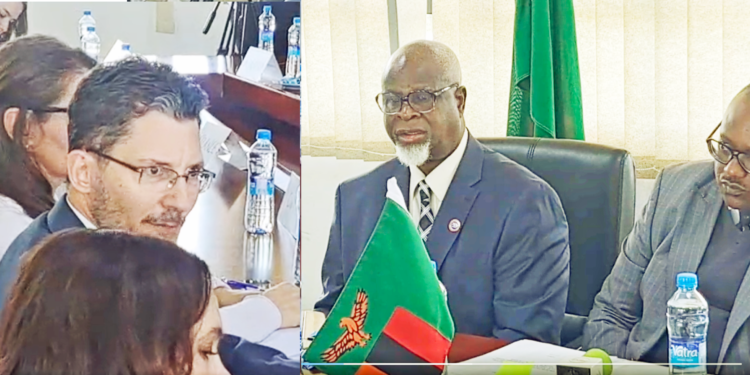Behind closed doors: US envoy ‘educates’ Haimbe, Muchima during tense meeting
By Mast Reporter
THE United States (US) Embassy in Zambia is unhappy that the United Party for National Development (UPND) government left out other major donors at an impromptu meeting called a fortnight ago to address thefts of drugs in the Ministry of Health.
And the US Embassy is disappointed that no action has been taken even after it shared a list of the names of private pharmacies selling donated but stolen medicines countrywide with the UPND government and the security wings.
Those familiar with the tense Lusaka meeting ostensibly called for “diplomatic consultation” said in reality, it was meant to admonish US Ambassador to Zambia Michael Gonzales for his public statement on the theft of medicines and medical supplies donated by his government.
But, they said, it turned into a lecture session with the Zambian ministers as the students on how not to handle important cooperating partners like the US.
This comes as yet another sign of increasingly strained relations between the US government and the UPND administration as a result of thefts and lack of action to address corruption in the health sector by President Hakainde Hichilema’s regime.
The Mast has now learned, with impeccable proof, that during the meeting, which was called by Minister of Foreign Affairs and International Cooperation Mulambo Haimbe, US Ambassador to Zambia Michael Gonzales wondered why the Zambian government had not invited the other important donors to the health sector, particularly United Nations (UN) agencies.
Gonzales was disappointed that the meeting, which was called by government’s representatives, Haimbe and Minister of Health Dr Elijah Muchima, did not have an agenda for cooperating partners to respond to.
“Certainly, many of us around the table are actively involved in supporting Zambia through the National Development Plan and, particularly, in the health sector. I would note that the invitation for today’s session just said a diplomatic consultation without reference to theme, health, drug commodity, theft or anything. And so perhaps knowing the subject only at the meeting didn’t provide optimal opportunity for each of us to maybe prepare and provide a more constructive provision,” Gonzales, who did not hide the fact that he was unhappy, said.
“I would also note that many of the larger cooperating partners in the health space are the UN family, UNFPA, the Global Fund, UNDP, who also are not here. And so perhaps a more expanded and earlier time notification for a more comprehensive conversation could be available in the future.”
At the same meeting, Gonzales informed the UPND government that the American people were interested in the forensic audit not only on the theft of donor aid but also Zambian government sourced medicines and medical supplies.
He said like the United Kingdom (UK) government’s interest in what was happening in Zambia’s health sector, the forensic audit was the only source of information which would state how deep the theft was in government.
“I would echo my UK colleagues’ mention of the interest in the findings of the forensic audit, both in terms of the theft of both the commodities that we as cooperating partners provide, but also I understand that the audit focuses on the theft of Zambian-resourced, Zambian government-procured commodities as well. I commend the government and His Excellency the President for the very bold step of commissioning not just a forensic audit but outsourcing it to a globally renowned firm who has a fantastic record around the world and in Zambia,” Gonzales said.
He said the US Embassy had shared a list of names of pharmacies which were selling donated but stolen medicines to the UPND government and the security wings for action, but nothing had been done to address the problem.
Gonzales said what was troubling was the fact that many of the pharmacies on the list where not even licensed.
“Of course, that happened six months after the first alarm bells were rung in April. In April, right after that initial meeting with my embassy, we did provide the Zambian government the list of the pharmacies. And by pharmacies, many of them are not licensed pharmacies, as we understand. They’re small retail vendors who are selling stolen commodities. But we provided that list to the Zambian authorities, and so any information that you might be able to share today, and note the presence of the Inspector General of Police, about what law enforcement action was taken through that first, say, nine months from being notified of places that were selling stolen commodities and presumably when the forensic audit was complete would also be very appreciated,” he said.
Recently, Gonzales announced that the US government had cut aid to Zambia’s Ministry of Health for essential medicines and medical supplies to the tune of K1.4 million (US$50 million) because of the failure by the Zambian government to plug the gross and systematic theft of materials donated by Americans to be given to needy Zambians free.
The announcement drew angry reactions from the Zambian government, with Haimbe openly rebuking Gonzales for not upholding the principles of the Geneva Convention on diplomacy.
But Gonzales defended his action during the meeting lecturing Haimbe and Dr Muchima that he was in fact, on his 11th assignment and 25 years of experience in international diplomacy, and was therefore fully committed to the requirements of the international convention on international diplomacy.

























